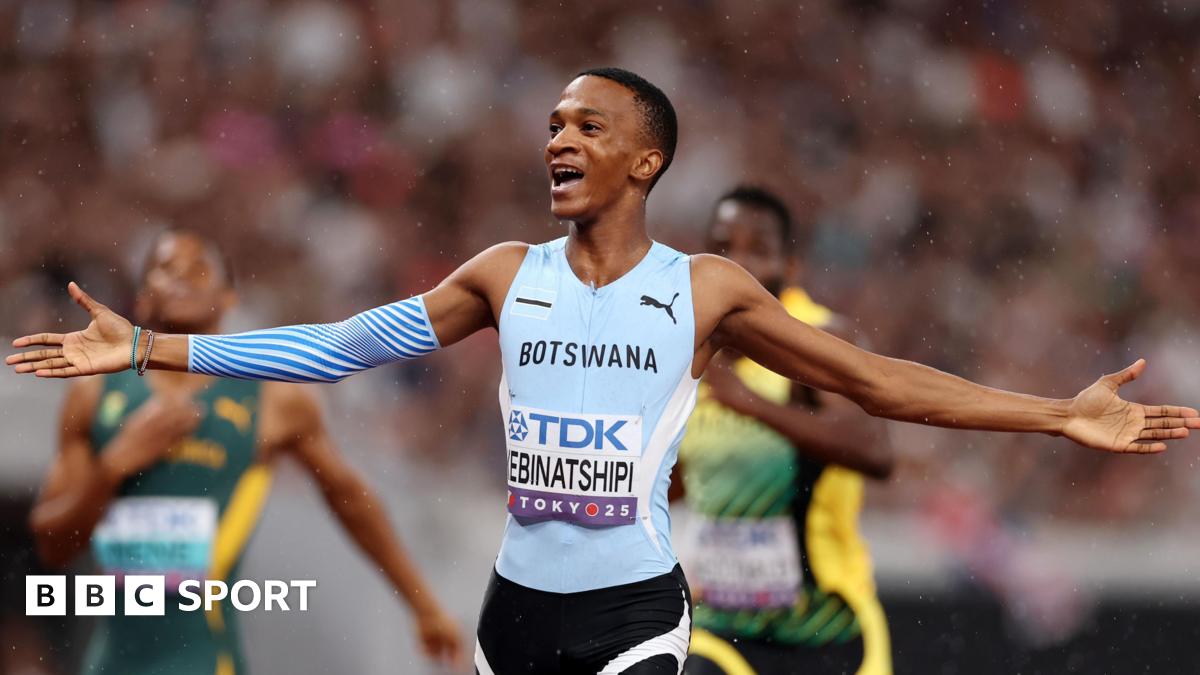Kebinatshipi targets 400m world record after Tokyo gold

```html Botswana's Kebinatshipi Targets 400m World Record After Tokyo Triumph
Botswana's Collen Kebinatshipi, the newly crowned world champion in the 400m, has declared his ambition to break Wayde van Niekerk's world record. The 21-year-old athlete’s statement comes after his stunning victory at the World Athletics Championships in Tokyo last month, where he clocked an impressive 43.53 seconds.
Kebinatshipi’s gold medal marks a significant milestone for Botswana, making him the first man from the nation to win a world title in athletics, following in the footsteps of Amantle Montsho, who won the women’s 400m in 2011.
Aiming for the Unbreakable
Van Niekerk's world record of 43.03 seconds, set at the 2016 Rio Olympics, has remained unchallenged for eight years. However, Kebinatshipi believes it is within reach. "Records are meant to be broken," he stated in an interview with the BBC World Service. "If I stay focused, if I stay injury free, everything is possible."
He expressed his delight with his recent performance, noting, "[Running] 43.5 at my age is something else." He had narrowly missed out on the Olympic final in Paris 2024.
Unexpected Victory
Kebinatshipi admitted that his victory in Tokyo was unexpected. "Honestly, my goal was to go there (Tokyo) and reach the final only because [I] missed the final at the Olympics. This was my motivation." He added, "Looking at my age, I didn't have any pressure of competing for a medal. I was just planning to start competing for a medal at the 2028 Olympics. So, things came early."
Push-ups in Tribute to Makwala
After securing his gold medal, Kebinatshipi celebrated by performing push-ups on the track, a tribute to his compatriot Isaac Makwala. Makwala famously did push-ups on a rain-soaked track at the 2017 World Championships in London after being cleared to compete solo in the 200m heats following a controversial norovirus outbreak that had prevented him from participating in the 400m final.
"Honestly, I was really exhausted but I kept my promise to my role model Isaac," Kebinatshipi explained. "I told him 'If I win this race, I'm going to dedicate this celebration to you' because he used to do the celebration during his time. The little energy that was left, I used it for the push-ups."
Relay Success and National Celebration
Kebinatshipi's success in Tokyo extended beyond the individual event. He anchored Botswana's 4x400m relay team to victory, securing his second gold medal of the championships. The team, which included Lee Bhekempilo Eppi, Bayapo Ndori, and Letsile Tebogo, edged out the United States and South Africa in a thrilling race.
"The team was really relying on me at that moment because I was the fastest," Kebinatshipi said. "And after winning the flat race they trusted me so much. I went to that final with a lot of motivation, with the positive vibes."
The relay victory sparked national celebrations in Botswana, with a public holiday declared in honor of the team's achievement. "It's amazing. Everyone was happy," Kebinatshipi remarked. "Now, going forward, it shows that my life is changing. I still have to focus because this was just a start of what will happen in the next 10 years, looking at my age."
Historical Context and Botswana's Rise in Athletics
Botswana's recent success in athletics, particularly in the 400m and relay events, represents a significant shift in the country's sporting landscape. Traditionally, football has been the most popular sport, but the achievements of athletes like Montsho, Makwala, Tebogo, and now Kebinatshipi, are inspiring a new generation and putting Botswana on the map as a force to be reckoned with in track and field.
Dr. Tshepang Mabeo, a sports analyst based in Gaborone, notes that "investment in grassroots development and strategic coaching have been crucial to Botswana's success. The athletes are also benefiting from exposure to international competitions and training camps." He further emphasizes that "the national pride generated by these victories is invaluable and will undoubtedly lead to greater participation in athletics."
Challenges Ahead
While Kebinatshipi's potential is undeniable, maintaining consistency and avoiding injuries will be crucial for him to achieve his ambitious goals. The 400m is a highly competitive event, and he will face stiff competition from established athletes like Van Niekerk and Michael Norman, as well as emerging talents from other countries. However, with his dedication, talent, and the support of his nation, Kebinatshipi has the potential to leave a lasting legacy in the world of athletics. ```
Originally sourced from: BBC News Africa
